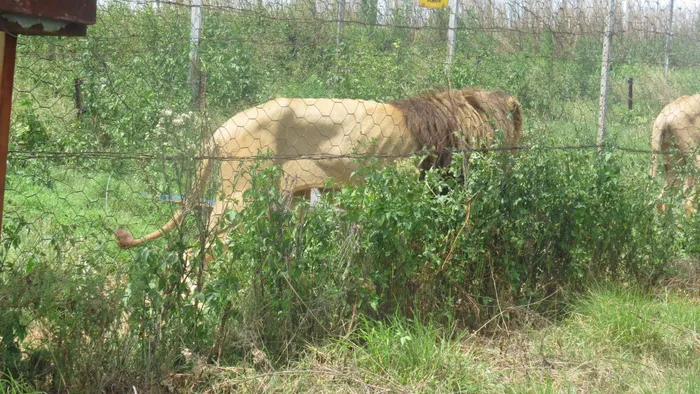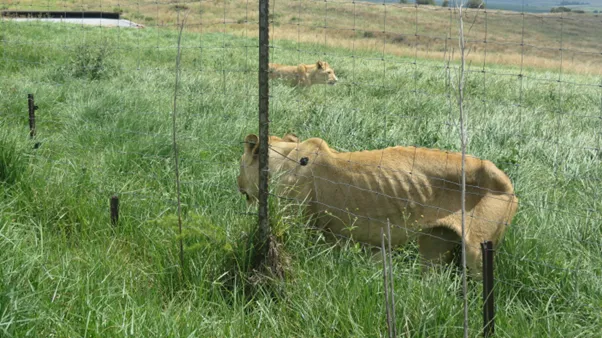Urgent reforms needed in South Africa's captive lion industry following cruelty conviction

The NSPCA discovered lions in various stages of starvation on a farm in the Free State. The owner has been convicted on charges of animal cruelty.
Image: Supplied
Animal welfare organisation Four Paws South Africa is urging the government to expedite the implementation of the phase-out plan of the captive lion industry following the conviction of Professor Thabo Masihlelo for starving the lions on his farm in the Free State.
The National Council of SPCAs (NSPCA) issued a statement this week announcing that Masihlelo had been convicted of animal cruelty and sentenced to a R5,000 fine or 10 months’ imprisonment, half of which is suspended for five years on condition that he does not re-offend.
In 2023, the NSPCA’s Wildlife Protection Unit (WPU) conducted an inspection at Masihlelo’s farm in Tweeling, where they discovered several lions in varying stages of starvation.
“Although Masihlelo claimed to breed captive lions under the guise of supporting conservation efforts in South Africa, he had failed to meet even the most basic requirement of feeding the animals. Lions, severely emaciated with visible ribs, spines, and hip bones, were left to endure prolonged starvation,” said the NSPCA.
Four Paws said South Africa has been a significant player in the global big cat industry, with an estimated 8,000 lions held in captivity across approximately 300 facilities.
These lions are often bred for profit-driven activities, including cub petting, trophy hunting, and the export of body parts for traditional medicine.
In 2021, the Department of Forestry, Fisheries and the Environment (DFFE) announced its intent to phase out the captive lion industry.
Daniels said while this was a commendable step, progress has been slow, and the lack of swift action continues to endanger the welfare of thousands of lions and other big cats.
She said this conviction emphasises the urgent need for comprehensive reform in South Africa's captive lion industry.
“This case is not an isolated incident but rather a symptom of systemic issues within the commercial breeding and exploitation of big cats. None of these captive-bred animals will be released into the wild to help wild populations; therefore, they are not a true conservation effort,” she said.
This case serves as a stark reminder of the consequences of inadequate oversight and the importance of genuine conservation efforts that prioritise animal welfare and animals in the wild, she warned.
“While this conviction is a significant step in acknowledging the gravity of animal cruelty in South Africa, we believe the penalties imposed do not yet reflect the serious nature of the suffering endured by these animals,” stated Daniels.
She said the discovery of starving lions in such conditions is not only a breach of ethical responsibility but a blatant violation of South Africa’s animal protection laws.
“We call for stricter penalties and the consistent enforcement of the Animal Protection Act to ensure that such cruelty is met with consequences that act as both a deterrent and a form of justice for the animals affected,” she said.
Describing what these lions had to endure, Daniels said the level of starvation indicated their prolonged suffering.
“In cases of extreme malnutrition, lions experience significant muscle wasting, weakened immune systems, and organ failure. The physical deterioration is accompanied by immense psychological distress, as these sentient beings suffer from hunger, pain, and the inability to engage in natural behaviours,” she said.

The NSPCA discovered lions in various stages of starvation on a farm in the Free State. The owner has been convicted on charges of animal cruelty.
Image: Supplied
Four Paws advised that if circumstances prevent proper care, there are established avenues to safeguard the lions' welfare, including voluntary exit from the captive lion industry, surrender to legitimate sanctuaries, as well as collaboration with authorities and NGOs.
“Neglecting the care of captive lions is unacceptable. Four Paws urges all individuals and facilities to proactively seek assistance and utilise available programmes to ensure the humane treatment of these animals.”
Daniels said the organisation continues to urge the government to implement meaningful reform, including the full phasing out of the commercial captive lion breeding industry, as announced in the 2021 Ministerial report, and to include all big cats in the phase-out.
“The protection of South Africa’s wildlife heritage must go hand in hand with animal welfare. Only through stronger legal frameworks and enforcement, as well as stricter penalties for cruelty, can we hope to see real change for animals in South Africa,” she stated.
karen.singh@inl.co.za
